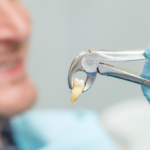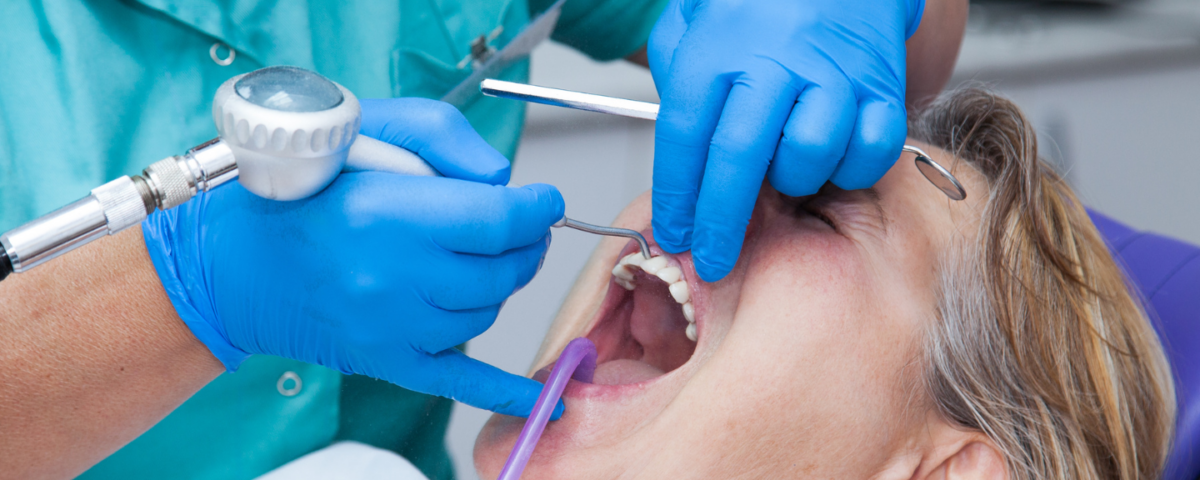
How Often Do You Need a Dental Check-Up?
October 31, 2023
What Can I Eat After Tooth Extraction
November 22, 2023When you go to the dentist, they help you to keep your teeth and gums healthy. Dental cleanings prevent both cavities and gum disease. One common form of gum disease is gingivitis. With your dentist’s help, you can stop this gum problem before it becomes worse and causes loose or lost teeth.
What Is Gingivitis?
Gingivitis refers to a condition when the gums become irritated and inflamed. It marks the first stage of gum disease and should serve as a warning to take action before the problem progresses to a more severe form of periodontal disease.
What Causes Gingivitis?
The most common cause of gingivitis and later forms of gum disease is plaque and tartar on the teeth near the gums.
Plaque is a sticky substance that can hold bacteria against the teeth. Everyone develops plaque at some point. However, regular brushing and flossing remove it from the teeth. If you miss some spots or skip brushing, the plaque will eventually harden into durable tartar. Only a professional can remove this tartar during a dental cleaning.
The bacteria in the plaque and tartar can infect the gums, causing inflammation and swelling that becomes gum disease.
Who Gets Gingivitis?
While anyone can get gingivitis, certain groups of people have higher risks for this condition. Being over 30 is a common risk factor. In fact, 47.2% of Americans over 30 have long-lasting forms of gum disease. Additionally, gum disease causes more tooth loss in those over 35 than cavities. Consequently, you need to begin taking exceptional care of your teeth and gums in your 30s to avoid gingivitis and gum disease.
Other factors that raise your risk of gum disease include conditions and medications that impact your blood flow or issues that prevent plaque removal.
- Habitual tobacco use, including smoking and chewing tobacco
- Pregnancy, menopause, puberty, taking hormonal birth control, and other situations that change hormone levels
- Taking medications that cause dry mouth
- Uncontrolled diabetes
- Poor oral hygiene habits
- Lack of adequate vitamins and minerals in the diet, especially vitamin C
- Medications or illnesses that suppress the immune system
If you have any of the above conditions, talk to your dentist to find out if you need more frequent dental cleanings to prevent gingivitis.
How Do I Know If I Have Gingivitis?
You will notice some very subtle signs when you first develop gingivitis. These symptoms will become more apparent as the condition progresses. Watch out for the following signs of gingivitis:
- Redness or swelling in the gums
- Occasional gum tenderness, but some people don’t feel tenderness in their gums
- Bleeding when flossing or brushing
- Bad breath
Contact your dentist if you notice any of the following. They will know how to treat gingivitis and preserve your oral health.
Why Is Gingivitis Treatment So Important?
Without treatment, gingivitis will only get worse. Only in rare cases can it reverse on its own. If gingivitis worsens to the later stages of periodontitis, you may have large pockets develop at the base of the teeth. Over time, these can cause the teeth to become loose or fall out.
How Does a Dentist Treat Gingivitis?
When you make an appointment with your dentist for gingivitis symptoms, the doctor will examine your teeth and gums to determine if you have gum disease and the degree of progression of the problem.
Scaling and Root Planing for Gingivitis
If you only have the mildest form of periodontal disease, called gingivitis, the dentist will likely recommend a deep cleaning called periodontal cleaning or planing and root scaling. This type of cleaning removes the plaque and tartar from around the teeth and under the gum line.
Scaling scrubs off plaque and tartar from under the gum line. This process also irrigates this area with an antimicrobial agent to stop bacterial growth.
Root planing smooths the root surfaces of the teeth to eliminate spaces where bacteria can take hold and grow. Smoothing the tooth surfaces also promotes natural healing to help your gums recover from gingivitis.
Surgery for Severe Gum Disease
For more serious forms of gum disease, you might require periodontal surgery to reduce the sizes of the pockets in your gums and save your teeth.
When you get treatment while gum disease is in its earliest stages, you have the chance to reverse the effects of the problem and prevent tooth loss.
How to Prevent Gingivitis
Preventing gingivitis is always the best option. There are several things you can do to lessen your chances of developing gum disease, regardless of your existing risk factors.
Take Care of Your Teeth
You need to take exceptional care of your teeth by flossing and brushing twice a day. These habits brush away plaque that can promote gingivitis, but even good brushing and flossing habits may miss some areas of plaque that can turn into tartar. Therefore, you should also make regular visits to your dentist to prevent gingivitis entirely.
See Your Dentist Regularly
Your dentist also plays a vital role in preventing gingivitis from developing or reappearing after treatment. Regular cleanings from your dentist are the only way to have tartar removed from your teeth. Additionally, during your dental visits, you’ll have your teeth and gums screened for signs of gum disease.
If you’ve had gum disease or risk factors for developing gingivitis, you might need to see your dentist more than twice a year for cleanings. Talk to your dentist about recommendations to find out the best dental schedule for you.
Stop Gingivitis-Promoting Habits
Several habits can raise your chances of gingivitis. If you smoke or use chewing tobacco, stop or cut back as much as you can. Using tobacco increases your chances of gum disease, oral cancer, and other forms of cancer. Stopping now can help your overall health.
If you have diabetes, keep your blood sugar in check to reduce your gingivitis risk. Similarly, if you have a condition that causes dry mouth, talk to your doctor or dentist about mouthwash options or other products to mitigate the problem.
Stop Gingivitis in Its Tracks with Help from Langley Dental Care
Whether you already have red, inflamed gums or want to avoid the pain of gingivitis, you need a dentist you feel good about seeing. At Langley Dental Care, we treat each of our patients like family. You’ll feel welcome as soon as you enter our Charlotte-area clinic. Contact us today to set up your visit for a preventative cleaning or gum evaluation and gingivitis treatment.



